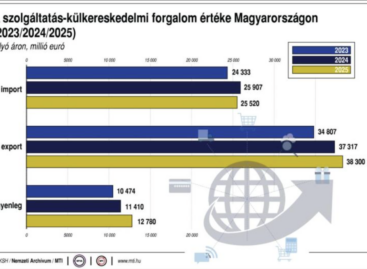Entrepreneurial heritage – the conquest of older companies
The expansion of older companies, the number of companies that have lived 25 years has almost tripled compared to 2018, approaching 77,000 today. The business environment is changing, and despite the attrition rates, more experienced businesses are standing firm. The number of private owners has decreased, about 200,000 fewer people participate in the ownership circle of social enterprises.
 The expansion of older companies, the number of companies that have lived 25 years has almost tripled compared to 2018, approaching 77,000 today. The business environment is changing, and despite the attrition rates, more experienced businesses are standing firm. The number of private owners has decreased, about 200,000 fewer people participate in the ownership circle of social enterprises.
The expansion of older companies, the number of companies that have lived 25 years has almost tripled compared to 2018, approaching 77,000 today. The business environment is changing, and despite the attrition rates, more experienced businesses are standing firm. The number of private owners has decreased, about 200,000 fewer people participate in the ownership circle of social enterprises.
During the past quarter of a century, every second newly founded company has disappeared from the business scene. According to OPTEN data, almost twice as many businesses were founded – close to 900 thousand – in the last 25 years as were operating in 2023. At the same time, the number of private individuals wishing to start a business has also decreased in the past ten years, and there are currently around 200,000 fewer owners of social enterprises. In 2013, every ninth individual between the ages of 15 and 74 was the owner of a social enterprise, while in 2023 this proportion has dropped to only every twelfth. This raises the question of whether the change carries a negative or a positive message. According to Csaba Alföldi, OPTEN’s company information expert, positive content is behind the transformation. After the crisis of 2008, a cleansing process was clearly started, which was also manifested in the lower annual numbers of company foundings (approx. 30,000 per year), in contrast to the 40,000-60,000 foundings of the previous period. In addition, entrepreneurial spirit was more focused on private individuals focusing on real economic activity, as opposed to forced entrepreneurs.
During the past quarter of a century, every second newly founded company has disappeared from the business scene. According to OPTEN data, almost twice as many businesses were founded – close to 900 thousand – in the last 25 years as were operating in 2023. At the same time, the number of private individuals wishing to start a business has also decreased in the past ten years, and there are currently around 200,000 fewer owners of social enterprises. In 2013, every ninth individual between the ages of 15 and 74 was the owner of a social enterprise, while in 2023 this proportion has dropped to only every twelfth. This raises the question of whether the change carries a negative or a positive message. According to Csaba Alföldi, OPTEN’s company information expert, positive content is behind the transformation. After the crisis of 2008, a cleansing process was clearly started, which was also manifested in the lower annual numbers of company foundings (approx. 30,000 per year), in contrast to the 40,000-60,000 foundings of the previous period. In addition, entrepreneurial spirit was more focused on private individuals focusing on real economic activity, as opposed to forced entrepreneurs.
Related news
KSH: The foreign trade surplus in services was 3.1 billion euros in the fourth quarter of last year
🎧 Hallgasd a cikket: Lejátszás Szünet Folytatás Leállítás Nyelv: Auto…
Read more >How does the forint exchange rate affect consumer prices?
🎧 Hallgasd a cikket: Lejátszás Szünet Folytatás Leállítás Nyelv: Auto…
Read more >Related news
MBH Analysis Center: The Hungarian economy may accelerate again in 2026, but the Iranian war carries serious risks
🎧 Hallgasd a cikket: Lejátszás Szünet Folytatás Leállítás Nyelv: Auto…
Read more >SPAR is preparing for an Easter rush: it is filling its stores with 570 tons of smoked meat products
🎧 Hallgasd a cikket: Lejátszás Szünet Folytatás Leállítás Nyelv: Auto…
Read more >Focus on the domestic fishing sector at SIRHA Budapest
🎧 Hallgasd a cikket: Lejátszás Szünet Folytatás Leállítás Nyelv: Auto…
Read more >








